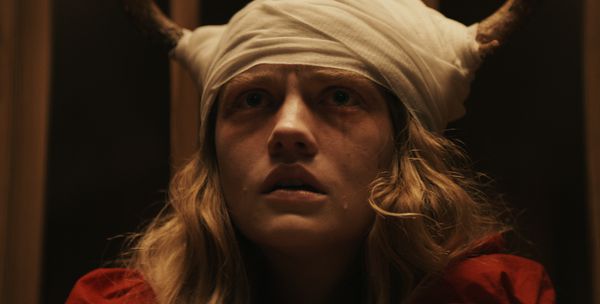Eye For Film >> Movies >> Fixation (2022) Film Review
Fixation
Reviewed by: Jennie Kermode

In the early , experimental period when doctors first began to take a serious interest in patients deemed mentally ill, not simply locking them away but trying to treat them, institutions housing women were popular places for men from assorted academic and artistic backgrounds to visit, to observe the inmates. They saw the women as fascinating because of how they failed to fit social norms, and often commented on how their unfeminine behaviour – sometimes the only real reason they were in there – made them unattractive, but they were drawn to their dark, sunken eyes, which are referenced again and again in their writings, paintings and sketches. The product of medication, lack of sleep, poor diet or simply the absence of make-up, those eyes were seen as revealing something wholly animal, disturbingly attractive. Dora (Maddie Hasson) has those eyes.
What does it mean when eyes become not windows for a woman to look out of, but objects onto which men project their shared fantasies? Screened as part of the 2022 Toronto International Film Festival, Fixation is full of fantasies and projections, and what the eyes see cannot be trusted. The name Dora carries a lot of weight, borrowed as it is from one of Sigmund Freud’s most famous patients, and it soon becomes clear that, like her, this Dora has experienced sexual abuse which her doctor is trying to reframe. She. too, is subjected to experimental therapy, though of a different kind; and yet, though she’s older, she has even less power.
We meet this Dora in what may be a flashback or a dream. She’s in a trophy room whose walls bear taxidermised animal heads, performing a dance routine, just a girl showing off her talents and having fun. Abruptly, there’s a banging sound, something trying to enter the room, and her mood changes to one of terror. She also begins to bleed from her nose. When she snaps into consciousness in a white-walled room, the nosebleed is still happening.
Dora has no idea how she arrived in the institution. Her memories are disjointed, but she has some sense of have committed a crime, or being suspected of one, and of being due to stand trial. Is she undergoing a psychiatric assessment as part of that process? She is primarily attended by one doctor, Dr. Melanie (Genesis Rodriguez), who wears the kind of severe and dramatic make-up that psychiatrists in real life avoid because it creates an increased risk of fixation. Behind the scenes but drawing ever closer is Dr. Clark (the ever reliable Stephen McHattie), the man directing her care, who seems to have something of a fixation on Dora herself.
There’s a lot on Dora’s mind, pushing ever closer to the surface. It hinges on her complicated relationship with her older brother, Griffin, an enthusiastic taxidermist who swore that he would always protect her. As she is immersed in cycles of dream-memory over and over again (with, perhaps, a little something else going on to support this), she struggles to re-evaluate what she knows. This is frustrating for the audience, but a bit of frustration is probably inevitable in order to connect us with what Dora is enduring. The Alice In Wonderland references are a bit much and, overused as they are both here and elsewhere, risk cheapening the whole thing. Director Mercedes Bryce Morgan creates something much more effective when she lets her own ideas come to the fore.
A lot hinges on Hasson’s performance, and she carries the film’s tonal shifts well, keeping viewers with her as she finds clarity amid the chaos. It’s not an easy process, and Morgan has something interesting to say about the difficulty of recognising and processing either guilt or innocence for women who habitually feel guilty about everything because they are constantly told that everything is their fault. There is also an exploration of sanity and gender as performative phenomena, which in turn complicate the process of determining personal identity and truth.
With this ambitious piece of work, Morgan has bitten off more than she can chew, but that doesn’t mean that there’s nothing to appreciate about it. Hasson’s transformation of Dora from the object of others’ fascination to a woman in touch with her own rational core is impressive to watch, as we finally see those eyes return the gaze. The anger behind it all is a century in the making, and this is a bold addition to the rising cacophony of female voices calling out for a reframing of the way we view the psyche, its malformations and the causes thereof.
Reviewed on: 10 Sep 2022














